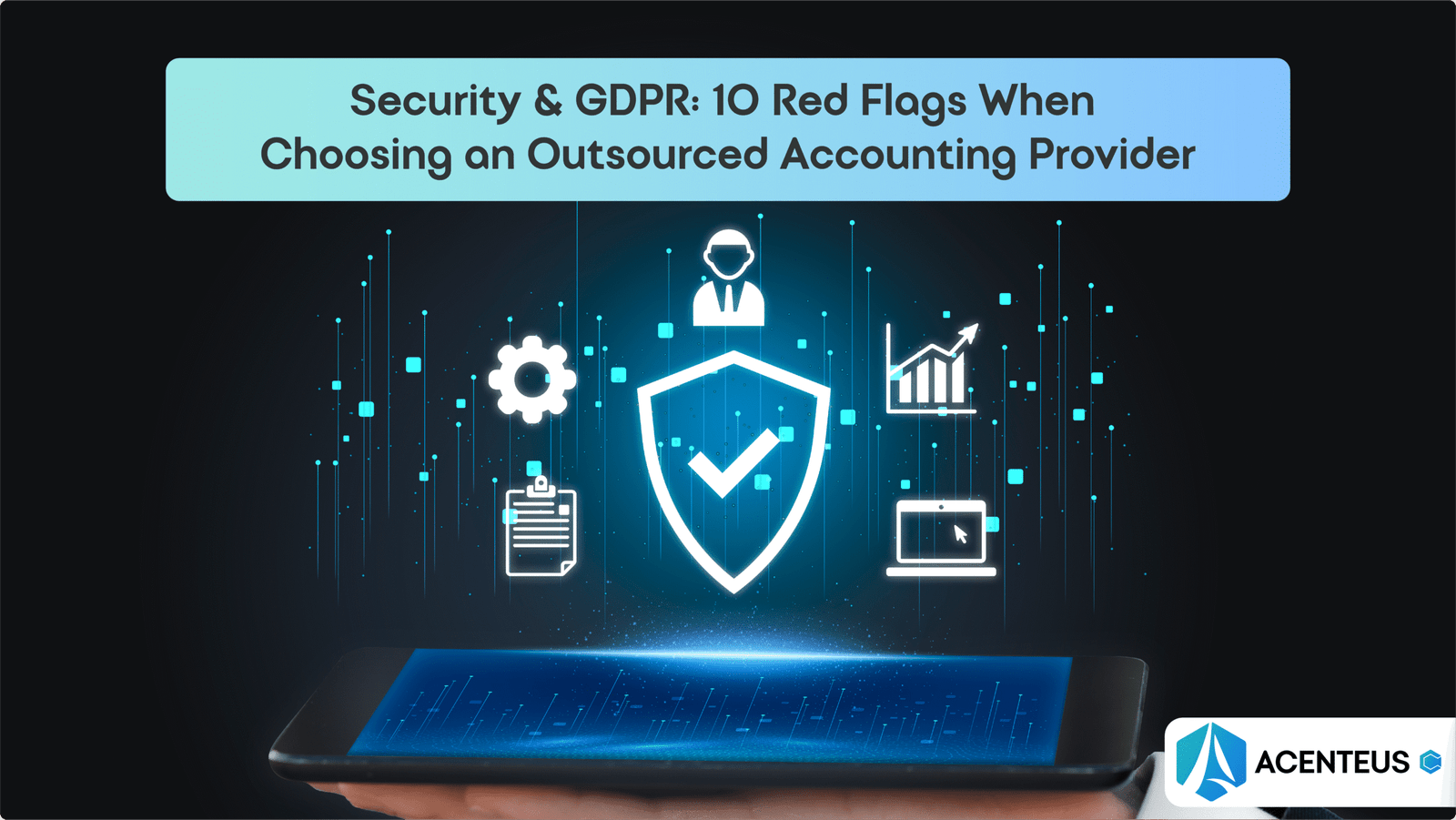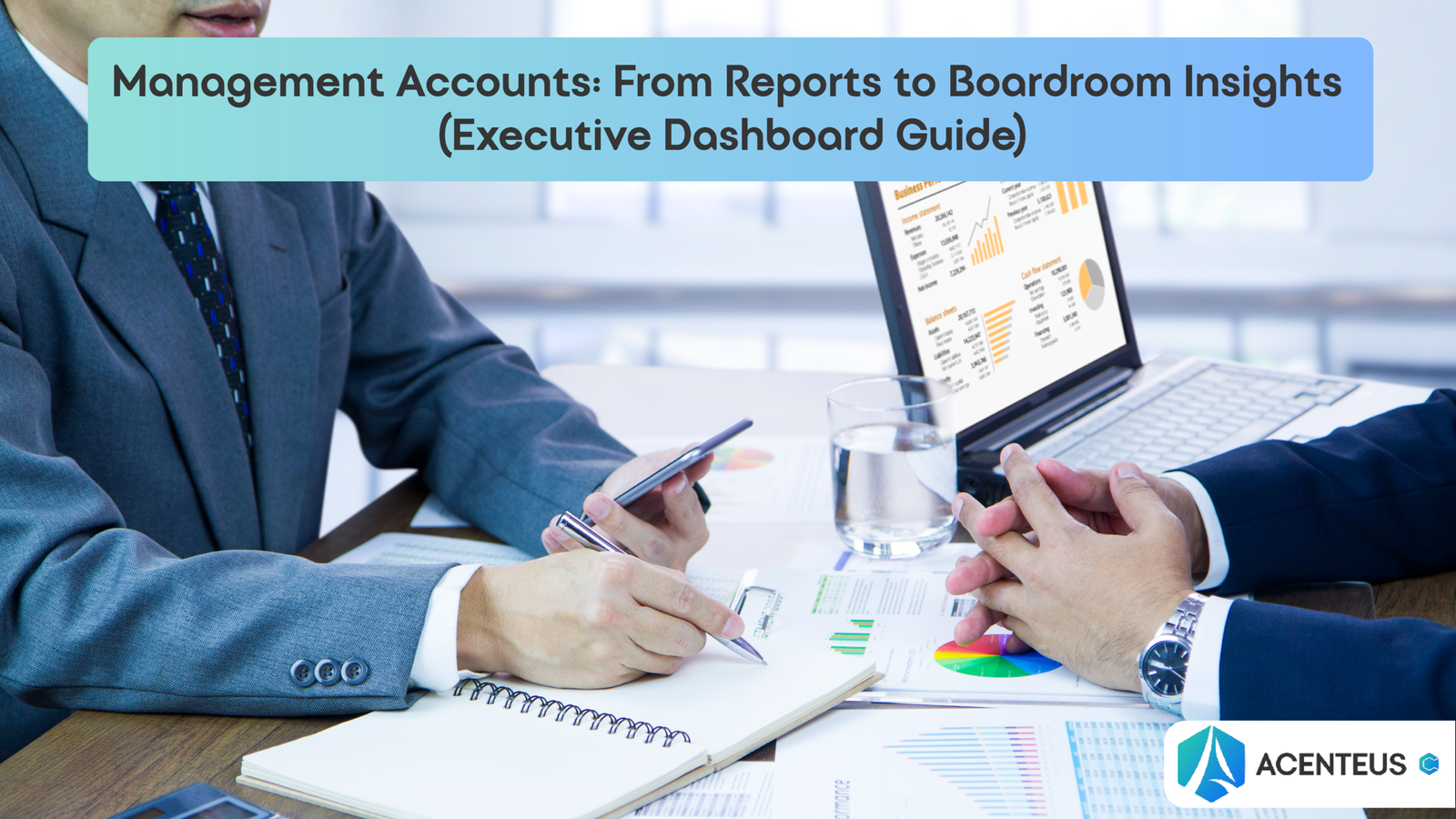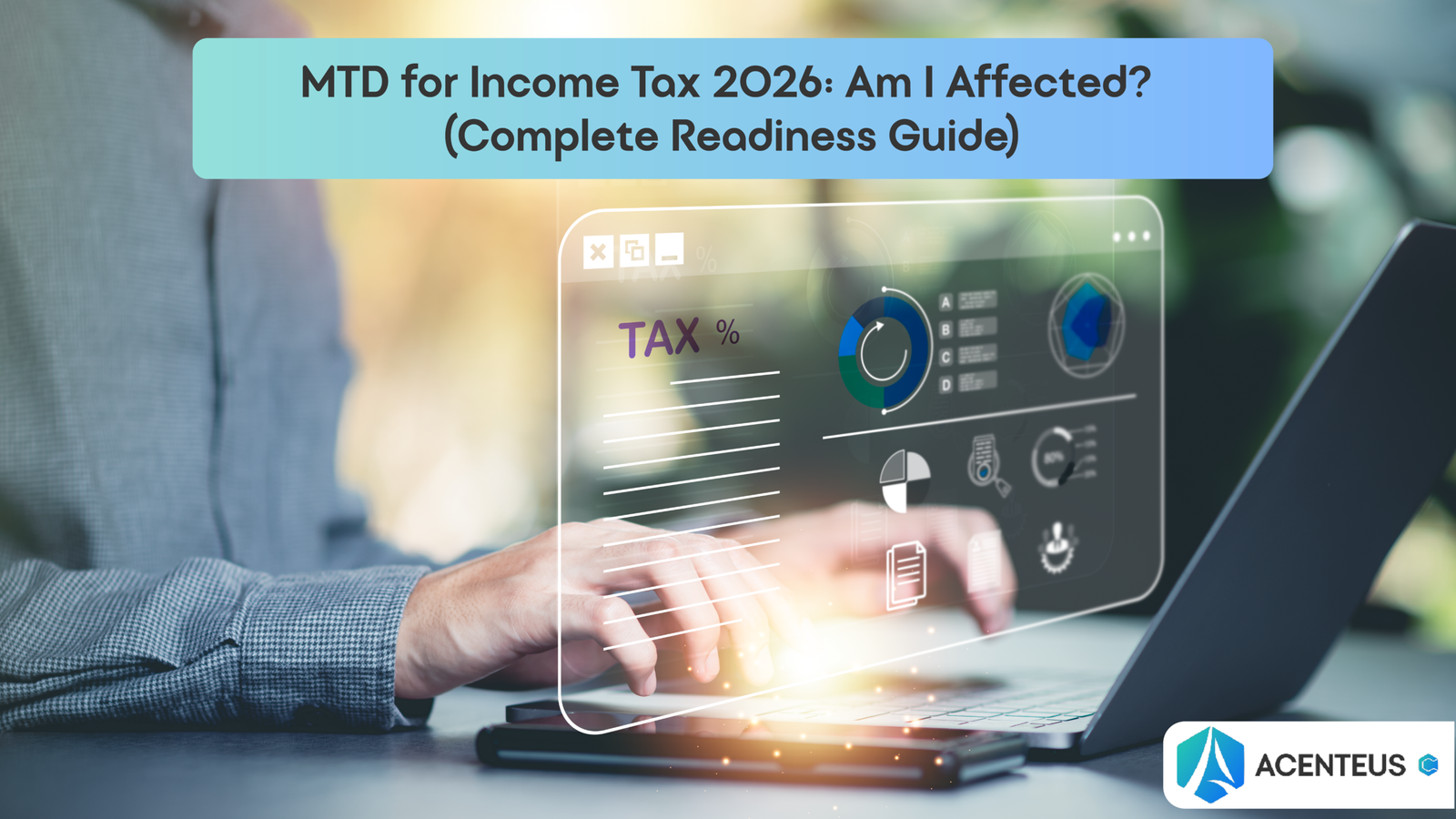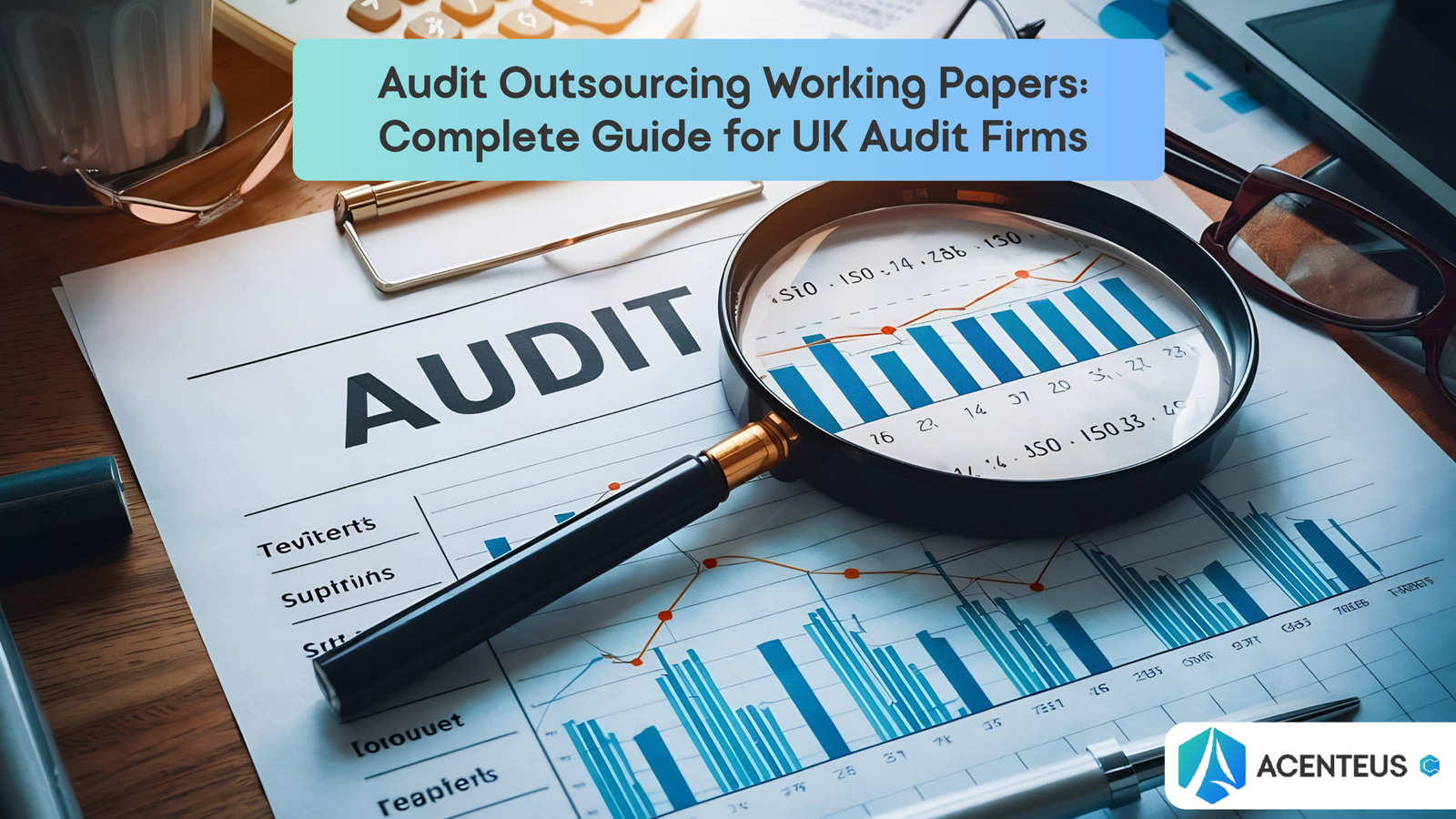Executive Summary
Selecting an outsourced accounting provider is a critical decision that could expose your practice to devastating financial penalties and reputational damage if data security fails. With the ICO imposing £2.7 million in GDPR fines during 2024 alone, and maximum penalties reaching £17.5 million or 4% of annual turnover, UK accounting practices cannot afford to overlook security compliance when outsourcing.
This comprehensive guide reveals the 10 critical red flags that signal inadequate data protection measures in potential outsourcing partners. From missing data processing agreements to insufficient cybersecurity insurance, we’ll examine each warning sign and provide practical checklists to protect your practice and clients. Learn how our outsourcing services for accountants at Acenteus-cca.com are built with security first.
Introduction: Why GDPR Compliance Can't Be an Afterthought
The integration of outsourced accounting services has become essential for UK practices seeking to remain competitive while managing costs and capacity constraints. However, this strategic shift introduces complex data protection responsibilities that many firms underestimate until it’s too late.
£17.5 Million in UK GDPR Fines During 2024
The ICO’s enforcement activity demonstrates the serious financial consequences of inadequate data protection measures. In 2024, UK businesses paid over £2.7 million in GDPR fines, with individual penalties ranging from £7,500 to £750,000.
The UK GDPR empowers supervisory authorities to impose fines of up to 4% of annual worldwide turnover, or £17.5 million, whichever is higher. For accounting practices, even a single serious breach could result in penalties that threaten business continuity and professional reputation.
The Cost of Getting It Wrong: Case Studies
Real-world examples illustrate the devastating impact of inadequate data security measures. UK businesses between 2023–24 faced fines totalling £15.5 million for various GDPR breaches, including cases where highly sensitive information was exposed through simple email errors.
One serious case involved the Police Service of Northern Ireland, which received a £750,000 penalty for a security breach. The Ministry of Defence also faced a £350,000 fine (reduced from £1 million) for inadequate security measures.
Your Legal Obligations as Data Controller
Under UK GDPR, accounting practices remain fully responsible for data protection compliance even when using outsourced providers. As the data controller, you must ensure that any data processor provides sufficient guarantees about its security measures and implements appropriate technical and organisational measures.
This responsibility cannot be delegated or transferred to the outsourcing provider. You retain full liability for any breaches or non-compliance, making rigorous due diligence essential before engaging external processors. This is a core part of our business process outsourcing philosophy.
Red Flag #1: Missing or Inadequate Data Processing Agreement
The foundation of any compliant outsourcing arrangement is a comprehensive Data Processing Agreement (DPA) that clearly defines responsibilities, obligations, and security requirements.
Essential DPA Components Checklist
A legally compliant DPA must include the following elements under Article 28 of UK GDPR:
- Processing Details: Subject matter, duration, nature, purpose of processing, types of personal data, and categories of data subjects.
- Security Obligations: Specific technical and organisational measures, staff confidentiality commitments, and breach notification procedures.
- Data Subject Rights: Procedures for handling Subject Access Requests (SAR), data portability, deletion capabilities, and support for controller compliance.
- Governance Framework: Clear authority, sub-processor approval, regular compliance reporting, and termination procedures.
Liability and Indemnification Clauses
Robust DPAs include comprehensive liability provisions and indemnification clauses that protect your practice from financial losses resulting from processor non-compliance or security breaches.
Key provisions should address:
- Professional indemnity insurance requirements.
- Direct liability for processor breaches of security obligations.
- Indemnification for third-party claims arising from processor failures.
Warning Signs in Contract Language
Red Flag Indicators:
- Vague or generic security commitments.
- Absence of breach notification timeframes.
- Limited liability clauses that cap processor responsibility below potential damages.
- Unclear data location provisions.
Red Flag #2: Vague Data Location and Transfer Policies
Post-Brexit data protection requirements have created complex obligations around data location and international transfers that many providers fail to address adequately.
UK GDPR Post-Brexit Requirements
Data processing within the UK generally provides the strongest compliance position, but many outsourcing providers operate across multiple jurisdictions.
International Transfer Mechanisms
When outsourcing involves international data transfers, providers must implement appropriate safeguards such as:
- Adequacy Decisions: Processing in countries recognised by the UK government.
- Standard Contractual Clauses: EU Commission-approved contract terms.
- Binding Corporate Rules: Internal policies approved by data protection authorities.
Questions to Ask About Data Residency
Critical Due Diligence Questions:
- Where exactly will our client data be processed and stored geographically?
- What specific legal mechanisms govern any international data transfers?
- How do you ensure compliance with both UK GDPR and destination country requirements?
Red Flag #3: Insufficient Access Controls and Authentication
Robust access controls form the first line of defence against both external attacks and internal data misuse.
Multi-Factor Authentication Requirements
Basic password protection is insufficient for accounting data access. Multi-factor authentication (MFA) should be mandatory for all system access.
Essential MFA Features:
- Time-based one-time passwords (TOTP) or hardware security keys.
- Biometric authentication where feasible.
- Session timeout and re-authentication requirements.
Role-Based Access Control (RBAC) Standards
Effective RBAC systems ensure staff can access only the minimum data required for their specific role, following the principle of least privilege.
Key RBAC Components:
- Granular permission structures aligned to job functions.
- Regular access reviews and automated deprovisioning procedures.
- Clear segregation of duties for sensitive accounting processes.
User Activity Monitoring and Logging
Comprehensive audit logs provide essential evidence for compliance demonstrations and incident investigations. The ICO requires organisations to maintain detailed records of data processing activities.
Red Flag #4: Lack of Encryption Standards
Encryption serves as the final protection layer when other security controls fail, making it essential for accounting data processing.
End-to-End Encryption for Data in Transit
The ICO considers encryption an appropriate technical measure. All data transmitted between your practice and outsourcing providers must be encrypted using current industry standards.
Technical Requirements:
- Transport Layer Security (TLS) 1.3 or higher.
- Perfect Forward Secrecy.
- Encrypted email gateways for sensitive document transmission.
At-Rest Encryption Requirements
Data stored on provider systems requires strong encryption to protect against physical theft, insider threats, and storage media compromise.
Implementation Standards:
- AES-256 encryption for all stored personal data.
- Encrypted database systems with key separation.
- Full-disk encryption for all storage devices.
Key Management and Security Protocols
Encryption effectiveness depends entirely on proper key management practices.
Essential Key Management Features:
- Hardware Security Modules (HSMs) for key generation and storage.
- Regular key rotation with automated deployment procedures.
- Secure key backup and recovery capabilities.
Red Flag #5: No Clear Data Breach Response Plan
Under UK GDPR, data processors must notify controllers of personal data breaches within 72 hours, making rapid response capabilities essential.
72-Hour Notification Requirements
The UK GDPR’s strict notification timeline leaves no room for confusion or delay. Outsourcing providers must have documented procedures that enable immediate breach detection and notification.
Required Response Elements:
- Automated monitoring systems for real-time breach detection.
- Clear escalation procedures with named contacts available 24/7.
- Established communication channels with relevant stakeholders.
Breach Assessment and Impact Analysis
Assessment Framework:
- Immediate containment procedures.
- Forensic investigation capabilities.
- Risk assessment methodology.
Communication Protocols with ICO
Red Flag #6: Missing ISO 27001 or Equivalent Certifications
Information security certifications provide independent verification that providers maintain appropriate technical and organisational measures.
Essential Security Certifications to Look For
ISO 27001 certification represents the gold standard for information security management, demonstrating a systematic approach to managing sensitive information.
Alternative Recognised Standards:
- SOC 2 Type II reports for service organisation controls.
- Cyber Essentials Plus certification from the UK government.
Third-Party Security Audits and Reports
Audit Report Contents Should Include:
- Penetration testing results.
- Vulnerability scanning reports.
- Security control effectiveness assessments.
Continuous Compliance Monitoring
Leading providers implement continuous monitoring and improvement programmes.
Ongoing Compliance Elements:
- Real-time security monitoring with automated alerting systems.
- Regular policy updates reflecting changing regulations and threats.
- Staff security training programmes.
Red Flag #7: Inadequate Staff Training and Background Checks
Human factors represent the greatest security vulnerability, making staff screening and training critical control points.
GDPR Training Requirements for Processing Staff
Comprehensive Training Programme Components:
- UK GDPR principles specific to accounting data.
- Data subject rights and procedures for handling requests.
- Security incident recognition and reporting procedures.
Background Verification Procedures
Given the sensitive nature of accounting information, staff with data access require enhanced screening.
Enhanced Due Diligence Requirements:
- Enhanced Disclosure and Barring Service (DBS) checks where applicable.
- Credit history verification.
- International background checks for global staff assignments.
Ongoing Education and Compliance Updates
Red Flag #8: Poor Data Subject Rights Management
UK GDPR grants individuals extensive rights over their personal data, creating operational obligations that outsourcing providers must support effectively.
Subject Access Request (SAR) Procedures
SAR Response Framework:
- Automated search capabilities across all data processing systems.
- Identity verification procedures.
- Secure delivery mechanisms for sensitive personal information.
Data Portability and Deletion Capabilities
Modern data subjects increasingly exercise their rights to data portability and deletion.
Technical Implementation Requirements:
- Structured data export capabilities in commonly used formats.
- Comprehensive deletion procedures that address backup and archived data.
Response Time Commitments
Red Flag #9: Unclear Data Retention and Deletion Policies
Sector-Specific Retention Requirements
Accounting practices must comply with various legal retention requirements.
Key Retention Periods:
- HMRC requires accounting records to be kept for at least 6 years.
- Anti-money laundering records must be kept for 5 years after the relationship ends.
Automated Deletion Processes
Manual data deletion processes are prone to error and inconsistency. Effective providers implement automated systems for compliant data lifecycle management.
Secure Data Disposal Methods
Red Flag #10: No Cybersecurity Insurance or Limited Coverage
Professional indemnity insurance provides the final financial protection against data security failures, but coverage must be appropriate to potential liabilities.
Professional Indemnity Insurance Requirements
Outsourcing providers require substantial insurance coverage that specifically addresses data protection liabilities.
Minimum Coverage Requirements:
- Professional indemnity coverage of at least £10 million for data processing errors.
- Cyber liability insurance covering breach response costs and business interruption.
Cyber Insurance Coverage Levels
Outsourcing providers require substantial insurance coverage that specifically addresses data protection liabilities.
Minimum Coverage Requirements:
- Professional indemnity coverage of at least £10 million for data processing errors.
- Cyber liability insurance covering breach response costs and business interruption.
Claims History and Coverage Verification
Verify coverage through direct communication with insurance providers rather than relying solely on certificates.
Due Diligence Checklist: Questions to Ask
Comprehensive due diligence requires systematic evaluation across technical, legal, and operational dimensions.
Technical Security Questionnaire
- What specific encryption standards do you use for data in transit and at rest?
- How do you implement multi-factor authentication and role-based access controls?
- Where geographically is our data processed, stored, and backed up?
Legal and Compliance Verification
- Can you provide current ISO 27001 or equivalent security certifications?
- How do you ensure ongoing compliance with UK GDPR requirements?
- What cybersecurity insurance coverage do you maintain and what are the limits?
References and Case Studies
- Can you provide references from UK accounting firms of similar size to ours?
- What specific security incidents have you experienced and how were they resolved?
Protecting Your Practice: Implementation Guide
Implementing robust security due diligence requires a systematic approach and ongoing monitoring throughout the outsourcing relationship.
- Phase 1: Initial Assessment: Complete technical and legal questionnaires, verify certifications and insurance.
- Phase 2: Detailed Evaluation: Review audit reports, test incident response capabilities.
- Phase 3: Contract Negotiation: Negotiate a comprehensive DPA, establish security Service Level Agreements (SLAs).
- Phase 4: Ongoing Monitoring: Conduct quarterly security review meetings, monitor compliance continuously.
Ready to protect your practice from costly security failures? Our outsourcing services for accountants team at Acenteus-cca.com specialises in GDPR-compliant solutions that eliminate these red flags from day one.
Don’t risk your practice’s reputation and financial stability on inadequate security measures. Contact us today for a confidential discussion about our security-first approach to accounting outsourcing. Learn more about our comprehensive business process outsourcing solutions designed specifically for UK accounting practices.
Vendor Due Diligence Checklist
Security Infrastructure Assessment:
- Current ISO 27001 or equivalent certification with valid expiry dates
- Multi-factor authentication mandatory for all data access
- End-to-end encryption using current industry standards (TLS 1.3, AES-256)
- Comprehensive access controls with role-based permissions
Legal and Compliance Framework:
- Comprehensive Data Processing Agreement meeting UK GDPR Article 28 requirements
- Clear data location policies with international transfer safeguards
- Professional indemnity insurance minimum £10 million covering data processing
- Cyber liability insurance with comprehensive breach response coverage
Operational Excellence:
- Documented incident response plan with 72-hour breach notification commitment
- Reference clients of similar size and complexity willing to provide testimonials
- Business continuity plans tested regularly with documented results
Conclusion
Selecting a GDPR-compliant outsourced accounting provider requires vigilance, expertise, and systematic due diligence. The 10 red flags outlined in this guide represent the most critical warning signs that signal inadequate data protection measures. With potential penalties reaching £17.5 million, UK accounting practices cannot afford to compromise on security compliance.
Remember that data protection responsibility remains with your practice regardless of outsourcing arrangements. You retain full liability for any breaches or compliance failures, making rigorous provider selection and ongoing monitoring essential for protecting your business and clients.
The investment in comprehensive security due diligence pays dividends through reduced risk, enhanced client confidence, and protection from potentially devastating penalties.
Looking to future-proof your firm? Schedule a consultation with Acenteus and discover how we can help you overcome your talent challenges with a tailored strategy
Frequently Asked Questions
Verify that the provider's ISO 27001 scope specifically includes accounting and financial data processing. The scope should cover all locations where your data will be processed.
Request a certificate of insurance that specifically names your firm as an additional insured party. Contact the insurance company directly to verify coverage limits, exclusions, and policy status.
As the data controller, you remain legally responsible for breach notification to the ICO within 72 hours and affected individuals where high risk exists. You'll also bear liability for regulatory penalties and compensation claims.
Consider additional certifications based on your specific needs: SOC 2 Type II for service organisation controls, Cyber Essentials Plus for government-recognised standards, or PCI DSS if processing payment data.
Conduct formal security reviews quarterly, with informal check-ins monthly. Monitor compliance with agreed service levels continuously.
Your provider must ensure all sub-contractors meet equivalent security standards and include them in your Data Processing Agreement (DPA). You have the right to object to specific sub-contractors.
Require AES-256 for data at rest and TLS 1.3 or higher for data in transit. Ensure key management follows industry best practices.
Request demonstrations of Subject Access Request (SAR) response capabilities and verify response timeframes meet statutory requirements.
Any provider unwilling to commit to UK GDPR-compliant DPA terms likely lacks adequate security infrastructure or legal understanding. This is a fundamental red flag that should eliminate them from consideration.
Calculate the total cost of inadequate security including potential GDPR fines, client compensation, and reputation damage. Focus on providers offering the best security value rather than the lowest headline prices.







